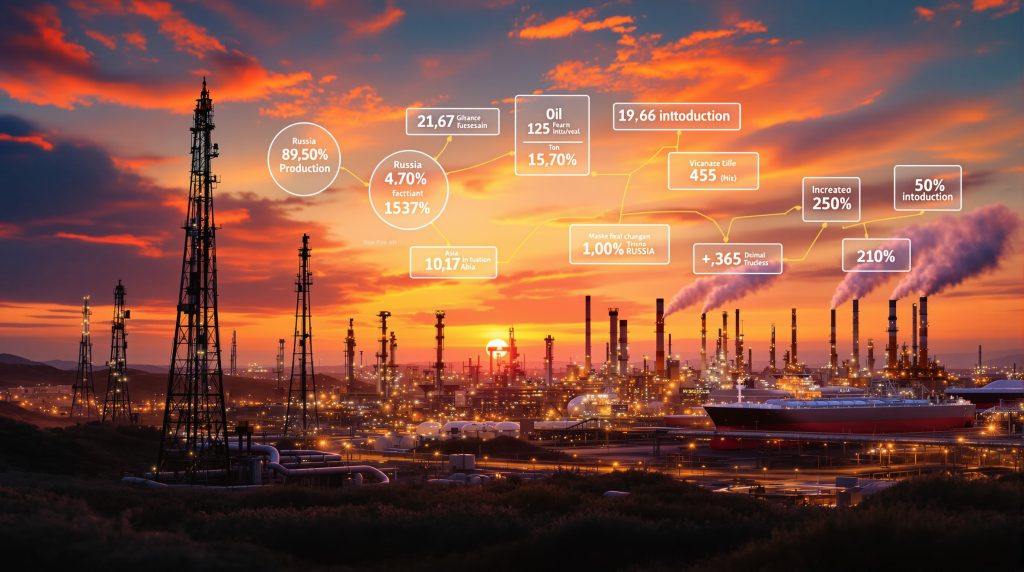Russia's Strategic Oil Production Expansion: Global Market Implications
Russia has strategically ramped up its crude oil production in recent months, approaching its OPEC+ quota ceiling as global energy markets continue to evolve. This calculated production increase comes amid complex geopolitical tensions and OPEC global oil influence that are reshaping the global energy landscape.
Russian Deputy Prime Minister Alexander Novak recently confirmed that the nation is steadily boosting output to fulfill its production quotas, emphasizing that while rapid production changes aren't feasible, gradual increases are being implemented systematically.
Current Production Levels and Quota Compliance
Russia's oil production reached approximately 9.17 million barrels per day (bpd) in August 2025, just below its OPEC+ ceiling of 9.26 million bpd. For September, the quota increased to 9.42 million bpd, with preliminary data suggesting Russia is approaching or meeting this target.
| Period | Actual Production (million bpd) | OPEC+ Quota (million bpd) | Compliance Rate |
|---|---|---|---|
| August 2025 | 9.17 | 9.26 | 99.0% |
| September 2025 | ~9.42 (estimated) | 9.42 | ~100% |
How Is Russia Managing Its Energy Infrastructure?
Refinery Operations and Domestic Supply
A significant driver behind Russia boosting oil production is heightened refinery activity, which has boosted fuel production for both domestic consumption and export markets. This strategic balancing act aims to:
- Ensure adequate domestic energy supplies
- Maintain export revenues
- Fulfill international production commitments
However, this expansion hasn't been without challenges. The Russian energy sector has faced:
- Infrastructure damage from Ukrainian drone attacks
- Operational disruptions at key facilities
- Temporary export restrictions on refined products
Market Impact Alert: Russia's increased refinery throughput has partially offset global refined product tightness, particularly in diesel markets where European supply concerns have persisted following refinery maintenance seasons.
What Are Russia's Long-Term Production Goals?
Strategic Energy Vision Through 2050
Russia has outlined ambitious long-term energy objectives that extend well beyond current production increases. The country's energy strategy targets:
- Increasing oil production to approximately 540 million tons annually by 2030
- Maintaining this production plateau through 2050
- Developing technological capabilities to sustain output from mature fields
- Expanding exploration in new frontier regions
These goals reflect Russia's continued commitment to its role as a major global energy supplier despite international sanctions and the global energy transition.
How Are Geopolitical Tensions Affecting Russian Oil Exports?
Export Challenges and Adaptations
Russia's oil export strategy has evolved significantly in response to geopolitical pressures:
-
Export Restrictions: The government has implemented temporary bans on gasoline exports and new diesel export restrictions for trading companies to address domestic fuel shortages.
-
Revenue Fluctuations: While pipeline crude oil export revenues have seen modest increases, seaborne oil and LNG revenues have experienced recent oil price stagnation insights.
-
Market Redirection: Russia has successfully redirected much of its crude exports to Asian markets, particularly India and China, offsetting Western sanctions.
-
Shadow Fleet Operations: A growing fleet of tankers operating outside traditional insurance and tracking systems has facilitated continued exports to certain markets.
What Impact Is Russian Production Having on Global Oil Markets?
Market Balancing and Price Effects
Russia boosting oil production is occurring as global oil markets navigate complex supply-demand dynamics:
-
OPEC+ Coordination: Russia's production growth aligns with the broader OPEC+ strategy of gradually increasing output as market conditions allow.
-
Price Stabilization: The measured production increase has helped prevent oil price crash analysis while maintaining price levels that support producer economies.
-
Market Competition: Increased Russian exports to Asian markets have intensified competition with Middle Eastern producers for market share in these growing demand centers.
-
Supply Chain Adjustments: Global refiners have adapted to changing Russian export patterns by adjusting procurement strategies and processing configurations.
How Sustainable Is Russia's Production Growth?
Technical and Economic Factors
Several factors will determine the sustainability of Russia's production expansion:
Technical Challenges
- Maintaining output from aging Western Siberian fields
- Developing more complex reservoirs in Eastern Siberia
- Addressing technological gaps created by Western sanctions
Economic Considerations
- Investment requirements for field maintenance and development
- Return on investment at various price points
- Competition for capital within Russia's economy
Geopolitical Variables
- Duration and scope of international sanctions
- Access to global financial markets
- Technology transfer limitations
Expert Insight: "Russia's production growth demonstrates remarkable resilience given the technical and financial constraints imposed by sanctions. However, long-term sustainability will depend on developing indigenous technological capabilities and maintaining access to key export markets."
What Does This Mean for Global Energy Transition?
Implications for Decarbonization Efforts
Russia's oil production expansion occurs against the backdrop of global energy transition efforts:
-
Investment Signals: Continued investment in production capacity signals Russia's expectation of sustained oil demand despite decarbonization initiatives.
-
Transition Timeframe: Russia's long-term production targets through 2050 suggest a view that oil will remain essential in the global energy mix for decades.
-
Economic Diversification: Oil revenues continue to fund Russia's broader economic activities, including potential investments in lower-carbon technologies.
-
Market Competition: Increased Russian production may maintain downward pressure on oil prices, potentially slowing the economic competitiveness of alternative energy sources.
FAQ: Russia's Oil Production Strategy
How does Russia's production compare to other major producers?
Russia remains among the world's top three oil producers alongside the United States and Saudi Arabia. Current production levels place Russia slightly behind the US (approximately 13.2 million bpd) and roughly equivalent to Saudi Arabia (around 9.5 million bpd when fully producing to quota).
Will Russian production continue to increase through 2026?
Based on current OPEC meeting impact and Russia's stated plans, production is expected to continue its gradual increase through 2026, contingent upon market conditions and quota adjustments. However, technical constraints and investment limitations may moderate the pace of growth.
How are sanctions affecting Russian production capabilities?
Western sanctions have primarily impacted Russia's access to advanced technologies for offshore and unconventional development, as well as financing for new projects. Despite these challenges, Russia has maintained production from existing fields and developed alternative supply chains and technical solutions.
What role does Russian oil play in global energy security?
Despite geopolitical tensions, Russian oil continues to be a significant component of global energy security, particularly for Asian economies. Complete removal of Russian supplies from global markets would create substantial supply shortfalls that would lead to US oil production decline challenges that would be difficult to replace in the short term.
Conclusion: Strategic Positioning in a Changing Market
Russia boosting oil production represents a strategic positioning within the evolving global energy landscape. By gradually boosting output while maintaining coordination with OPEC+ partners, Russia is balancing multiple objectives:
- Maximizing revenue from hydrocarbon resources
- Maintaining market share in key consuming regions
- Demonstrating resilience despite international sanctions
- Preserving long-term production potential
As global markets continue to evolve amid energy transition pressures and geopolitical realignments, Russia's production strategy will likely remain adaptive, balancing immediate economic needs with longer-term market positioning.
Further Exploration:
Readers interested in learning more about global oil market dynamics can also explore related educational content available from OilPrice.com, which offers regular updates on energy market developments, production trends, and geopolitical factors affecting the global oil industry.
Want to Stay Ahead of Major Mineral Discoveries?
Discovery Alert's proprietary Discovery IQ model delivers instant notifications on significant ASX mineral discoveries, empowering investors to make informed decisions before the broader market reacts. Explore how historic discoveries have generated substantial returns by visiting our discoveries page and start your 30-day free trial today.




